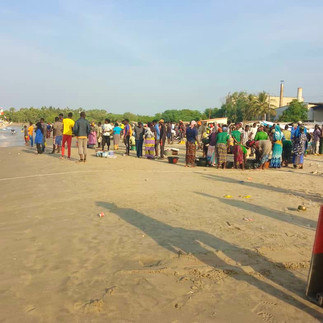As the peak fishing season begins in Gunjur, it brings with it a wave of opportunities and benefits. The bustling shores, filled with fishermen and traders, paint a picture of economic vitality and promise. For many in the community, this is a season of hope and financial relief. However, beneath the surface lies a pressing question: Are we prepared to handle the consequences of this economic boom?

A Season of Opportunities
The significance of the fishing season in Gunjur cannot be overstated. Hundreds find temporary employment, from fish marketers to laborers. Local businesses, including restaurants, shopkeepers, and transport providers, enjoy increased patronage. For property owners, this season is a goldmine, as they rent out homes to temporary fishing migrants.
For many families, the benefits are tangible. Host families often receive daily fish supplies from migrants, alleviating household expenses. The availability of affordable fish at the beach benefits the entire community, ensuring access to nutritious food at reasonable prices.
The government, too, reaps rewards through licenses issued to foreign fishing boats and permits for migrant workers. At its best, this season represents an ecosystem of mutual benefit, fueling livelihoods and boosting the local economy.
The Hidden Costs
But the story doesn’t end there. Every opportunity comes with challenges, and the peak fishing season is no exception. Overcrowding during this period puts a strain on local resources, and the ripple effects are becoming hard to ignore.
Sanitation Crisis
One glaring issue is the lack of sanitation facilities. With the influx of people, toilets are insufficient, leading to open defecation along the coast. Walking along certain stretches of the beach has become an unpleasant experience, with human waste, litter, and rotten fish creating both an eyesore and a health hazard.
Environmental Degradation
The beach, once pristine, is now marred by piles of trash. Improper waste management has led to sharp objects, fish skeletons, and other hazardous materials being carelessly discarded. The smell of rotten fish wafts through the air, reminding us of the urgent need for better waste disposal systems.
Rising Crime and Drug Use
Overcrowding has also contributed to an increase in crime and drug use, particularly cannabis. Reports of theft and other illegal activities are becoming common. Without sufficient security measures in place, the beach risks becoming unsafe for both residents and visitors.
Economic Exploitation
Illegal currency trading, often at unregulated rates, further complicates the economic landscape. While some profit from these practices, they undermine the local economy and create financial instability.
It’s clear that the benefits of the fishing season come at a cost. But does it have to be this way? The answer lies in proactive measures and community collaboration.
First and foremost, sanitation must be addressed. The local council, in partnership with the Village Development Committee, should invest in building additional toilets and providing trash bins. Clean beaches are not just an environmental necessity — they are crucial for public health and the community’s image.
Security is another priority. Deploying patrol teams to monitor the beache can help deter crime and ensure safety. Residents also have a role to play, particularly landlords. By ensuring their tenants are registered with local authorities, they can contribute to a safer and more accountable community.
Finally, the government must regulate currency exchange and crack down on illegal practices. Transparency and enforcement are key to protecting the local economy from exploitation.
A Shared Responsibility
The fishing season in Gunjur is a gift to the community, but it’s also a test of our ability to manage growth responsibly. While the influx of migrants and economic activity is a welcome development, it’s up to us to ensure that this prosperity doesn’t come at the expense of our health, safety, and environment.
As a community, we must take ownership of these challenges and work together to create sustainable solutions. After all, the true measure of success isn’t just the wealth we generate — it’s the legacy we leave for future generations.
The peak fishing season should be a time of celebration, not contention. With the right approach, Gunjur can thrive as a model fishing community, balancing economic growth with environmental stewardship and social responsibility.
Editor's note: Buba K. Touray is the Programme Director of BE REEL Gambia. The opinions expressed here belong to the author and may not reflect the perspectives of Gunjuronline.com. Do you have a story an opinion piece you’d like to share? Get in touch by contacting us at: editor@gunjuronline.com
Share your views on this article in the comments below.














Comments